farewell arms(《永别了,武器》简介)
浅析《永别了-武器》中主人公的男性气概--文献综述1【范本模板】
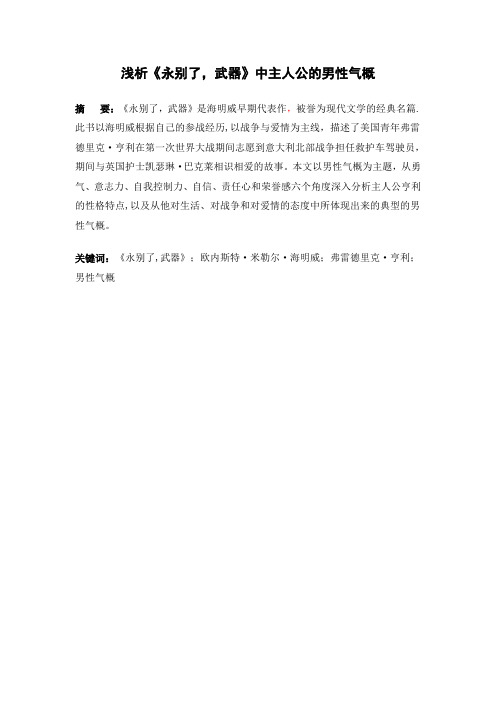
浅析《永别了,武器》中主人公的男性气概摘要:《永别了,武器》是海明威早期代表作,被誉为现代文学的经典名篇.此书以海明威根据自己的参战经历,以战争与爱情为主线,描述了美国青年弗雷德里克·亨利在第一次世界大战期间志愿到意大利北部战争担任救护车驾驶员,期间与英国护士凯瑟琳·巴克莱相识相爱的故事。
本文以男性气概为主题,从勇气、意志力、自我控制力、自信、责任心和荣誉感六个角度深入分析主人公亨利的性格特点,以及从他对生活、对战争和对爱情的态度中所体现出来的典型的男性气概。
关键词:《永别了,武器》;欧内斯特·米勒尔·海明威;弗雷德里克·亨利;男性气概A Brief Analysis of the Main Character's Manliness inA Farewell to ArmsAbstracts:A Farewell to Arms is one of the representative novels of Hemingway in his early time,which was also praised as a classic masterpiece of modern literature。
According to Hemingway’s own experience of the war,with war and love as the main line,this book talks about the American youth Frederic Henry went to northern Italy volunteered as an ambulance driver during World War I , and the love story between Henry and the British nurse Catherine Barkley. This paper takes manliness as the theme,analyzes Henry's personality from the perspectives of courage,willpower,self-control,self-confidence, responsibility and honor, as well as his attitude to life,war and love.Key words:A Farewell to Arms; Ernest Miller Hemingway;Frederic Henry;manlinessLiterature Review1.Ernest Miller Hemingway and A Farewell to ArmsErnest Miller Hemingway (1899–1961)was an American novelist,short story writer,and journalist. His economical and understated style had a strong influence on 20th-century fiction, while his life of adventure and his public image influenced later generations. Hemingway produced most of his work s between the mid—1920s and the mid-1950s, and won the Nobel Prize in Literature in 1954. He published seven novels, six short story collections, and two non-fiction works。
永别了,武器 中文简介及英文summary
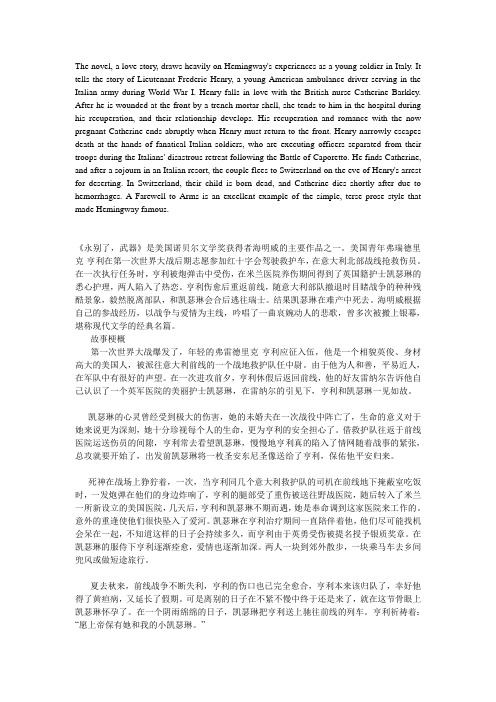
The novel, a love story, draws heavily on Hemingway's experiences as a young soldier in Italy. It tells the story of Lieutenant Frederic Henry, a young American ambulance driver serving in the Italian army during World War I. Henry falls in love with the British nurse Catherine Barkley. After he is wounded at the front by a trench mortar shell, she tends to him in the hospital during his recuperation, and their relationship develops. His recuperation and romance with the now pregnant Catherine ends abruptly when Henry must return to the front. Henry narrowly escapes death at the hands of fanatical Italian soldiers, who are executing officers separated from their troops during the Italians' disastrous retreat following the Battle of Caporetto. He finds Catherine, and after a sojourn in an Italian resort, the couple flees to Switzerland on the eve of Henry's arrest for deserting. In Switzerland, their child is born dead, and Catherine dies shortly after due to hemorrhages. A Farewell to Arms is an excellent example of the simple, terse prose style that made Hemingway famous.《永别了,武器》是美国诺贝尔文学奖获得者海明威的主要作品之一。
海明威的小说《永别了,武器》中的象征主义手法

海明威的小说《永别了,武器》中的象征主义手法海明威是美国现代主义文学的代表作家之一,他的小说《永别了,武器》是他创作生涯中最著名的作品之一。
这部小说以第一次世界大战为背景,通过描写战争的残酷和人性的脆弱,向读者展示了战争的荒谬与无情。
在《永别了,武器》中,海明威运用了象征主义手法来深化故事情节和塑造人物形象,使小说充满了内涵和象征意味。
首先,小说中的雨水和天气象征着战争的无情和阴暗。
在小说中,战场上经常下雨,雨水不仅给士兵们带来了寒冷和不舒服的感觉,更重要的是雨水象征着战争的残酷和不可避免的死亡。
在小说中,主人公弗雷德里克·亨利(Frederic Henry)经历了数次雨水的洗礼,每一次他都感到无助和迷茫。
同时,小说中也描写了阳光稀少的环境,这进一步加强了战争的荒谬和冷酷。
海明威通过这些气候描写,传递出了对战争的深深忧虑和对人类命运的悲观态度。
其次,战争中的武器象征着残暴和毁灭的力量。
小说中的武器是战争的工具,它们不仅具有杀伤力,更重要的是它们代表了战争中人类的贪婪和无情。
在小说中,弗雷德里克·亨利是一名意大利志愿军,他见证了战争的种种残酷和毁灭。
战争中的武器成为了主人公生活中不可避免的存在,它们挥之不去,无时无刻不在威胁着士兵们的生命和安全。
海明威通过描写战争中的武器,象征性地表达了对战争及其破坏力量的反思和抵制。
再次,小说中的金发女性凯瑟琳(Catherine)象征着爱情和希望。
在小说中,凯瑟琳是弗雷德里克·亨利在战争中所遇见的女性,他们的相遇和相爱成为了小说的一个重要情节。
凯瑟琳代表了弗雷德里克在战争中寻找到的爱和心灵的归宿。
她的金发象征着光明和希望,在弗雷德里克的人生中,凯瑟琳的出现为他带来了温暖和勇气。
然而,在战争的阴影下,他们的爱情也变得脆弱而不稳定。
最终,凯瑟琳的死亡成为了小说的另一象征,它象征着战争的残酷和无情,以及弗雷德里克失去了爱和希望。
此外,小说中的鸟和动物也被用作象征元素。
论永别了武器中的象征主义手法
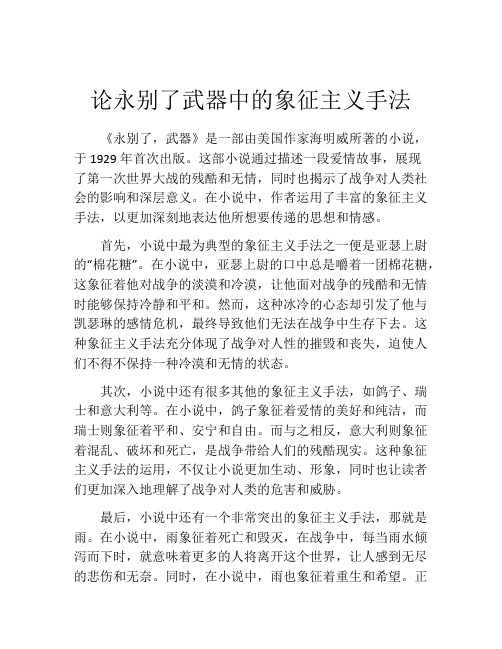
论永别了武器中的象征主义手法《永别了,武器》是一部由美国作家海明威所著的小说,于1929年首次出版。
这部小说通过描述一段爱情故事,展现了第一次世界大战的残酷和无情,同时也揭示了战争对人类社会的影响和深层意义。
在小说中,作者运用了丰富的象征主义手法,以更加深刻地表达他所想要传递的思想和情感。
首先,小说中最为典型的象征主义手法之一便是亚瑟上尉的“棉花糖”。
在小说中,亚瑟上尉的口中总是嚼着一团棉花糖,这象征着他对战争的淡漠和冷漠,让他面对战争的残酷和无情时能够保持冷静和平和。
然而,这种冰冷的心态却引发了他与凯瑟琳的感情危机,最终导致他们无法在战争中生存下去。
这种象征主义手法充分体现了战争对人性的摧毁和丧失,迫使人们不得不保持一种冷漠和无情的状态。
其次,小说中还有很多其他的象征主义手法,如鸽子、瑞士和意大利等。
在小说中,鸽子象征着爱情的美好和纯洁,而瑞士则象征着平和、安宁和自由。
而与之相反,意大利则象征着混乱、破坏和死亡,是战争带给人们的残酷现实。
这种象征主义手法的运用,不仅让小说更加生动、形象,同时也让读者们更加深入地理解了战争对人类的危害和威胁。
最后,小说中还有一个非常突出的象征主义手法,那就是雨。
在小说中,雨象征着死亡和毁灭,在战争中,每当雨水倾泻而下时,就意味着更多的人将离开这个世界,让人感到无尽的悲伤和无奈。
同时,在小说中,雨也象征着重生和希望。
正是因为雨水为植物的成长提供了充足的水分和营养,因此雨也给人们带来了重生和生机。
这种象征主义手法,使得小说不仅突出了战争对人类的危害,同时也给予了人们对未来的希望和信仰。
总体来看,《永别了,武器》中的象征主义手法非常丰富多彩,从而让小说更加深刻地表达了作者的思想和情感。
同时,这些象征主义手法让读者能够更加生动、形象地感受到战争对人类的破坏和危害。
虽然这部小说已经出版了近一个世纪,但其中传递的思想和情感依然能够深深地触动着人们的内心。
相信通过我们的共同努力,我们能够摆脱战争的阴影,创造出一个更加和平、美好的未来。
《永别了,武器》中生态女性主义思想解析
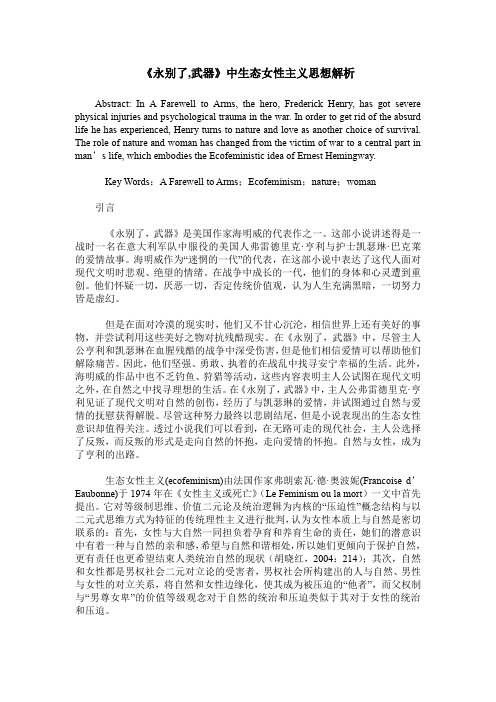
《永别了,武器》中生态女性主义思想解析Abstract: In A Farewell to Arms, the hero, Frederick Henry, has got severe physical injuries and psychological trauma in the war. In order to get rid of the absurd life he has experienced, Henry turns to nature and love as another choice of survival. The role of nature and woman has changed from the victim of war to a central part in man’s life, which embodies the Ecofeministic idea of Ernest Hemingway.Key Words:A Farewell to Arms;Ecofeminism;nature;woman引言《永别了,武器》是美国作家海明威的代表作之一。
这部小说讲述得是一战时一名在意大利军队中服役的美国人弗雷德里克·亨利与护士凯瑟琳·巴克莱的爱情故事。
海明威作为“迷惘的一代”的代表,在这部小说中表达了这代人面对现代文明时悲观、绝望的情绪。
在战争中成长的一代,他们的身体和心灵遭到重创。
他们怀疑一切,厌恶一切,否定传统价值观,认为人生充满黑暗,一切努力皆是虚幻。
但是在面对冷漠的现实时,他们又不甘心沉沦,相信世界上还有美好的事物,并尝试利用这些美好之物对抗残酷现实。
在《永别了,武器》中,尽管主人公亨利和凯瑟琳在血腥残酷的战争中深受伤害,但是他们相信爱情可以帮助他们解除痛苦。
因此,他们坚强、勇敢、执着的在战乱中找寻安宁幸福的生活。
此外,海明威的作品中也不乏钓鱼、狩猎等活动,这些内容表明主人公试图在现代文明之外,在自然之中找寻理想的生活。
关于海明威作品《永别了,武器》人道主义思想的悲剧色彩表现

文学评论·外国文学关于海明威作品《永别了,武器》人道主义思想的悲剧色彩表现袁超 海南大学摘 要:文学能够记录人的生活,反映人的思想。
知名作家海明威为后人留下了许多脍炙人口的作品。
这些作品真实地记录下了他的所思所想。
作为参加过一战的作家,海明威亲眼目睹了战争给人带来的毁灭性的灾难。
他同情战争中的人们,但自己却无能为力。
历经人生种种,海明威意识到在这样一个复杂的社会里,人们很难找到幸福。
人们迷失了,他们不再是自己命运的主宰,他们的命运掌控在他人的手中。
人道主义思想是指人应该像真正的人一样的活着。
首先,人们的基本需求要得到保障。
其次,人们有追求幸福的权利。
第三,人们的精神世界是饱满的。
然而,在海明威生活的年代,人们的生活一片混乱,与他们长期以来的理想生活相悖。
本文通过分析海明威的三部主要作品,揭示海明威的人道主义思想的悲剧的体现,结合当时的社会背景,以期达到对作品更加广泛和深刻的了解。
关键词:人道主义思想;悲剧表现;人们的价值观;社会背景作者简介:袁超(1992-),女,汉族,安徽黄山人,英语文学硕士,海南大学外国语学院英语专业研究生在读,研究方向:英美文学。
[中图分类号]:I106 [文献标识码]:A[文章编号]:1002-2139(2018)-06-110-01引言:二十世纪的美国发生了巨大变化,例如第一次世界大战的爆发,经济大萧条等等。
随着社会的变化,人们的价值观也需要改变。
然而,只有少数人能适应当时的社会环境,大多数人却迷失了。
其中最具代表性的就是“迷惘的一代”。
恩斯特•海明威是便是其中之一。
他参加了第一次世界大战。
他目睹了这场战争带来的灾难,动荡的社会使他无法适应自己的生活。
海明威在生活中迷失了自己。
海明威是一个人道主义者。
他对生活有着强烈的热情,他想要享受生活。
他认为人们应该有追求幸福和自由的权利。
每个人都有自己的价值,应该受到尊重。
人是自己的主人,他们应该控制自己的生活。
人生是一段漫长的旅程。
从《永别了,武器》看海明威对和平呼唤

从《永别了,武器》看海明威对和平的呼唤摘要美国著名小说家海明威的诸多作品都被誉为反映20世纪现实问题和揭露社会本质的经典著作,其围绕战争主题的小说更是西方文学中的经典。
本文通过深入了解海明威早期创作的小说《永别了,武器》来阐述作者的反战观,并以主人公亨利的战争经历以及爱情结局来说明小说的创作意图为揭露战争的实质,通过以亨利为代表的士兵人物来表达对和平的强烈渴望。
海明威本人对和平的号召通过这部小说得到了充分的展现,帮助他成为上世纪反对战争和呼唤和平的重要作家。
关键词:《永别了,武器》欧内斯特·海明威反战主题和平呼唤中图分类号:i106.4 文献标识码:a一引言欧内斯特·海明威在语言运用和叙事艺术上的成就巨大,他创作的系列作品都围绕战争主题展开了深刻的描述,为美国文学树立了新的方向。
《永别了,武器》是海明威早期人生迷茫时倾力创作的一部小说,他巧妙地利用多种艺术手法来表达小说号召世界和平的主题。
反讽和象征手法的使用让作品的魅力无限,读者在阅读过程中无不为作者高超的写作水平所折服,这部小说帮助海明威往更高的文学殿堂前进,成为他创作生涯中的代表作之一。
小说《永别了,武器》通过主人公亨利的故事来表达反战的思想,因为无休止的战争剥夺了这个年轻人的希望和爱情,他开始对一切事物都毫无反应,是战争让年轻人失去了对美好生活渴望的权利。
小说在叙述故事发生的来龙去脉时使用的是一种冷峻、麻木的语调,但是在海明威的润色下却显得散发出不一样的文字魅力。
读者在不断阅读的过程中开始体会到作者的用心良苦,小说语言带有鲜明的戏谑韵味,在文学气氛的渲染下显得更加犀利和辛辣。
海明威这样描写到军队的情况:“这场雨持续了好久,军队里的大多士兵都患上了霍乱疾病,但是霍乱中只有七千人死去。
”海明威在陈述军队士兵所面临的困境时使用了十分平淡的口气,而当有七千士兵死去时他也仅是用了“只有”这个词,彷佛这些人数和生命的重量还远远不够似的。
farewell arms(《永别了,武器》简介)

Something about the book
The novel is a semi-autobiographical novel of Hemingway who had World War I experiences.(《永别了,武器》是海明威半自传体式的小说) A Farewell to Arms is about the tragic romance between an American soldier Frederic Henry, and Catherine Barkley, a British nurse.(小说讲述了男主角 亨利和女主角凯瑟琳之间的爱情悲剧) The novel is about the individual tragedy in World War Ⅰ within the larger picture of greater tragedy.(战争中的个人悲剧与整个人类的悲剧) The book is also an anti-war novel, as the vivid descriptions of its brutality and cruelty.(反战题材小说,反映了战争的残酷与血腥)
A Farewell to Arms
《永别了,武器》 Hemingway
——Made by
Contents
Brief introduction about Hemingway(海明威)
Something about the book
Famous sentences and paragraphs
That’s all!
Thank you!
——Made by
What do you know about Hemingway?
永别了,武器(AFarewellToArms)ErnestHemingway英文文字..

永别了,武器(A Farewell To Arms) Ernest Hemingway英文文字版A FAREWELL TO ARMS by Ernest HemingwayFlyleaf:The greatest American novel to emerge from World War I, _A Farewell toArms_ cemented Ernest Hemingway's reputation as one of the most importantnovelists of the twentieth century. Drawn largely from Hemingway's ownexperiences, it is the story of a volunteer ambulance driver wounded on theItalian front, the beautiful British nurse with whom he falls in love, and theirjourney to find some small sanctuary in a world gone mad with war. By turnsbeautiful and tragic, tender and harshly realistic, _A Farewell to Arms_ is oneof the supreme literary achievements of our timeCopyright 1929 by Charles Scribner's SonsCopyright renewed 1957 by Ernest HemingwaySCRIBNER1230 Avenue of the AmericasNew York, NY 10020This book is a work of fiction. Names, characters,and incidents either are products of the author's imagination or are used fictitiously. Any resemblance to actual events or locales or persons,living or dead, is entirely coincidentalAll rights reserved including the right of reproduction in whole or in part in anyformISBN 0-684-83788-9A FAREWELL TO ARMSBOOK ONE1 In the late summer of that year we lived in a house in a village that lookedacross the river and the plain to the mountains. In the bed of the river therewere pebbles and boulders, dry and white in the sun, and the water was clearand swiftly moving and blue in the channels. Troops went by the house anddown the road and the dust they raised powdered the leaves of the trees. Thetrunks of the trees too were dusty and the leaves fell early that year and wesaw the troops marching along the road and the dust rising and leaves, stirredby the breeze, falling and the soldiers marching and afterward theand white except for the leaves The plain was rich with crops; there were many orchards of fruit trees andbeyond the plain the mountains were brown and bare. There was fighting inthe mountains and at night we could see the flashes from the artillery. In thedark it was like summer lightning, but the nights were cool and there was notthe feeling of a storm coming Sometimes in the dark we heard the troops marching under the windowand guns going past pulled by motor-tractors. There was much traffic at nightand many mules on the roads with boxes of ammunition on each side of theirpack-saddles and gray motor trucks that carried men, and other trucks withloads covered with canvas that moved slower in the traffic. There were bigguns too that passed in the day drawn by tractors, the long barrels of the gunscovered with green branches and green leafy branches and vines laid over thetractors. To the north we could look across a valley and see a forest of chestnuttrees and behind it another mountain on this side of the river. There wasfighting for that mountain too, but it was not successful, and in the fall when therains came the leaves all fell from the chestnut trees and the branches werebare and the trunks black with rain. The vineyards were thin and bare-branched too and all the country wet and brown and dead with the autumn. There were mists over the river and clouds on the mountain and thetrucks splashed mud on the road and the troops were muddy and wet in theircapes; their rifles were wet and under their capes the two leather cartridge-boxes on the front of the belts, gray leather boxes heavy with thepacks of clips of thin, long 6.5 mm. cartridges, bulged forward under the capesso that the men, passing on the road, marched as though they were six months gone with child There were small gray motor cars that passed going very fast; usuallythere was an officer on the seat with the driver and more officers in the backseat. They splashed more mud than the camions even and if one of the officers in the back was very small and sitting between two generals, hehimself so small that you could not see his face but only the top of his cap andhis narrow back, and if the car went especially fast it was probably the King. Helived in Udine and came out in this way nearly every day to see how thingswere going, and things went very badly At the start of the winter came the permanent rain and with the rain camethe cholera. But it was checked and in the end only seven thousand died of it inthe army2 The next year there were many victories. The mountain that was beyondthe valley and the hillside where the chestnut forest grew was captured andthere were victories beyond the plain on the plateau to the south and wecrossed the river in August and lived in a house in Gorizia that had a fountainand many thick shady trees in a walled garden and a wistaria vine purple onthe side of the house. Now the fighting was in the next mountains beyond andwas not a mile away. The town was very nice and our house was very fine. Theriver ran behind us and the town had been captured very handsomelymountains beyond it could not be taken and I was very glad the Austriansseemed to want to come back to the town some time, if the war should end,because they did not bombard it to destroy it but only a little in a military wayPeople lived on in it and there were hospitals and caf ? and artillery up sidestreets and two bawdy houses, one for troops and one for officers, and with theend of the summer, the cool nights, the fighting in the mountains beyond thetown, the shell-marked iron of the railway bridge, the smashed tunnel by theriver where the fighting had been, the trees around the square and the longavenue of trees that led to the square; these with there being girls in the town,the King passing in his motor car, sometimes now seeing his face and littlelong necked body and gray beard like a goat's chin tuft; all these with thesudden interiors of houses that had lost a wall through shelling, with plasterand rubble in their gardens and sometimes in the street, and the wholegoing well on the Carso made the fall very different from the last fall when wehad been in the country. The war was changed too The forest of oak trees on the mountain beyond the town was gone. Theforest had been green in the summer when we had come into the town but nowthere were the stumps and the broken trunks and the ground torn up, and oneday at the end of the fall when I was out where the oak forest had been I saw acloud coming over the mountain. It came very fast and the sun went a dullyellow and then everything was gray and the sky was covered and the cloudcame on down the mountain and suddenly we were in it and it was snow. Thesnow slanted across the wind, the bare ground was covered, the stumps oftrees projected, there was snow on the guns and there were paths in the snowgoing back to the latrines behind trenches Later, below in the town, I watched the snow falling, looking out of thewindow of the bawdy house, the house for officers, where I sat with a friendand two glasses drinking a bottle of Asti, and, looking out at the snow fallingslowly and heavily, we knew it was all over for that year. Up the river themountains had not been taken; none of the mountains beyond the river hadbeen taken. That was all left for next year. My friend saw the priest from ourmess going by in the street, walking carefully in the slush, and pounded on thewindow to attract his attention. The priest looked up. He saw us and smiledMy friend motioned for him to come in. The priest shook his head and went onThat night in the mess after the spaghetti course, which every one ate veryquickly and seriously, lifting the spaghetti on the fork until the loose strandshung clear then lowering it into the mouth, or else using a continuous lift andsucking into the mouth, helping ourselves to wine from the grass-coveredgallon flask; it swung in a metal cradle and you pulled the neck of the flaskdown with the forefinger and the wine, clear red, tannic and lovely, poured outinto the glass held with the same hand; after this course, the captaincommenced picking on the priest The priest was young and blushed easily and wore a uniform like the restof us but with a cross in dark red velvet above the left breast pocket of his graytunic. The captain spoke pidgin Italian for my doubtful benefit, in order that Imight understand perfectly, that nothing should be lost "Priest to-day with girls," the captain said looking at the priest and at meThe priest smiled and blushed and shook his head. This captain baited him often "Not true?" asked the captain. "To-day I see priest with girls.""No," said the priest. The other officers were amused at the baiting "Priest not with girls," went on the captain. "Priest never with girls," heexplained to me. He took my glass and filled it, looking at my eyes all the time,but not losing sight of the priest "Priest every night five against one." Every one at the table laughed. "Youunderstand? Priest every night five against one." He made a gesture andlaughed loudly. The priest accepted it as a joke "The Pope wants the Austrians to win the war," the major said. "He lovesFranz Joseph. That's where the money comes from. I am an atheist.""Did you ever read the 'Black Pig'?" asked the lieutenant. "I will get you a copy. It was that which shook my faith.""It is a filthy and vile book," said the priest. "You do not really like it.""It is very valuable," saidthe lieutenant. "It tells you about those priestsYou will like it," he said to me. I smiled at the priest and he smiled back across the candle-light. "Don't you read it," he said "I will get it for you," said the lieutenant "All thinking men are atheists," the major said. "I do not believe in the FreeMasons however.""I believe in the Free Masons," the lieutenant said. "It is a nobleorganization." Some one came in and as the door opened I could see the snowfalling "There will be no more offensive now that the snow has come,"I said "Certainly not," said the major. "You should go on leave. You should go toRome, Naples, Sicily--""He should visit Amalfi," said the lieutenant. "I will write you cards to myfamily in Amalfi. They will love you like a son.""He should go to Palermo.""He ought to go to Capri.""I would like you to see Abruzzi and visit my family at Capracotta," said thepriest "Listen to him talk about the Abruzzi. There's more snow there than hereHe doesn't want to see peasants. Let him go to centres of culture andcivilization.""He should have fine girls. I will give you the addresses of places in NaplesBeautiful young girls--accompanied by their mothers. Ha! Ha! Ha!" The captainspread his hand open, the thumb up and fingers outspread as when you makeshadow pictures. There was a shadow from his hand on the wall. He spoke again in pidgin Italian. "You go away like this," he pointed to the thumb, "andcome back like this," he touched the little finger. Every one laughed "Look," said the captain. He spread the hand again. Again the candle-light made its shadows on the wall. He started with the upright thumb and named intheir order the thumb and four fingers, "soto-tenente the thumb, tenente firstfinger, capitano next finger, maggiore next to the little finger, and tenentecolonello the little finger. You go away soto-tenente! You come backsoto-colonello!" They all laughed. The captain was having a great success withfinger games. He looked at the priest and shouted, "Every night priest fiveagainst one!" They all laughed again "You must go on leave at once," the major said "I would like to go with you and show you things," the lieutenant said "When you come back bring a phonograph.""Bring good opera disks.""Bring Caruso.""Don't bring Caruso. He bellows.""Don't you wish you could bellow like him?""He bellows. I say he bellows!""I would like you to go to Abruzzi," the priest said. The others wereshouting. "There is good hunting. You would like the people and though it iscold it is clear and dry. You could stay with my family. My fatheris a famoushunter.""Come on," said the captain. "We go whorehouse before it shuts.""Good-night," I said to the priest "Good-night," he said3 When I came back to the front we still lived in that town. There were manymore guns in the country around and the spring had come. The fields weregreen and there were small green shoots on the vines, the trees along the roadhad small leaves and a breeze came from the sea. I saw the town with the hilland the old castle above it in a cup in the hills with the mountains beyond,brown mountains with a little green on their slopes. In the town there weremore guns, there were some new hospitals, you met British men and sometimes women, on the street, and a few more houses had been hit by shellfire. Jt was warm and like the spring and I walked down the alleyway of trees,warmed from the sun on the wall, and found we still lived in the same houseand that it all looked the same as when I had left it. The door was open, therewas a soldier sitting on a bench outside in the sun, an ambulance wasby the side door and inside the door, as I went in, there was the smell of marblefloors and hospital. It was all as I had left it except that now it was spring. Ilooked in the door of the big room and saw the major sitting at his desk, thewindow open and the sunlight coming into the room. He did not see me and Idid not know whether to go in and report or go upstairs first and clean up. Idecided to go on upstairs The room I shared with the lieutenant Rinaldi looked out on the courtyardThe window was open, my bed was made up with blankets and my thingshung on the wall, the gas mask in an oblong tin can, the steel helmet on thesame peg. At the foot of the bed was my flat trunk, and my winter boots, theleather shiny with oil, were on the trunk. My Austrian sniper's rifle with its bluedoctagon barrel and the lovely dark walnut, cheek-fitted, schutzen stock, hungover the two beds. The telescope that fitted it was, I remembered, locked in thetrunk. The lieutenant, Rinaldi, lay asleep on the other bed. He wokeheard me in the room and sat up "Ciaou!" he said. "What kind of time did you have?""Magnificent."We shook hands and he put his arm around my neck and kissed me "Oughf," I said "You're dirty," he said. "You ought to wash. Where did you go and what didyou do? Tell me everything at once.""I went everywhere. Milan, Florence, Rome, Naples, Villa San Giovanni,Messina, Taormina--""You talk like a time-table. Did you have any beautiful adventures?""Yes.""Where?""Milano, Firenze, Roma, Napoli--""That's enough. Tell me really what was the best.""In Milano.""That was because it was first. Where did you meet her? In the CovaWhere did you go? How did you feel? Tell me everything at once. Did you stayall night?""Yes.""That's nothing. Here now we have beautiful girls. New girls never been tothe front before.""Wonderful.""You don't believe me? We will go now this afternoon and see. And in thetown we have beautiful English girls. I am now in love with Miss Barkley. I willtake you to call. I will probably marry Miss Barkley.""I have to get washed and report. Doesn't anybody work now?""Since you are gone we have nothing but frostbites, chilblains, jaundice,gonorrhea, self-inflicted wounds, pneumonia and hard and soft chancresEvery week some one gets wounded by rock fragments. There are a few realwounded. Next week the war starts again. Perhaps it start again. They say soDo you think I would do right to marry Miss Barkley--after the war of course?""Absolutely," I said and poured the basin full of water "To-night you will tell me everything," said Rinaldi. "Now I must go back tosleep to be fresh and beautiful for Miss Barkley."I took off my tunic and shirt and washed in the cold water in the basinWhile I rubbed myself with a towel I looked around the room and out the。
《永别了,武器》读后感

《永别了,武器》读后感《永别了,武器》是美国作家海明威的一部经典小说,以第一次世界大战为背景,讲述了一对恋人弗雷德里克和凯瑟琳在战争的洪流中经历了种种挫折和磨难,最终只能黯然分别的故事。
这部小说感人至深,令人陷入沉思。
在小说中,海明威描绘了残酷而冷酷的战争场面,给我们带来强烈的视觉和感官上的冲击。
在这个大杀器横行的时代,生命变得越来越微不足道,而战争也变得越来越冷漠和无情。
这种无情不仅体现在敌军之间的残杀,也体现在上级军官对士兵们不计其数的安排和利用上。
在这个充满了死亡和破坏的世界里,人的尊严和价值似乎被彻底遗忘了。
然而,在这个冰冷而残酷的世界里,弗雷德里克和凯瑟琳的爱情却是那么的纯粹和温暖。
他们在战争的洪流中相遇,相爱,并共同经历了许多危险和苦难。
他们的爱情是那么的美好和深刻,给人留下了深刻印象。
无论他们身处何地,他们都时刻牵挂彼此,且心有灵犀一点通。
然而,命运却曲折而残酷地将他们分开,让青春和爱情最终只能成为回忆。
通过阅读《永别了,武器》,我们能够深刻地感受到战争的残酷与无情,也能够感受到爱情的美好与深刻。
海明威以其独特的写作风格和深入的洞察力,刻画了一个怀着深爱之心、却受到无情冷遇的男女,以及处在那个充满赤裸真实和残酷无情的战争时代里的亿万人。
总之,海明威的《永别了,武器》是一部感人至深,思考性极强的小说。
它告诉我们,无论在战争还是和平的时代里,人的尊严和价值都应该得到认可和尊重,而爱情则是跨越时空、超越生死的,它给人的生命注入了希望和动力。
这部小说让我们深刻地认识到,我们需要在这个世界上,珍惜每一个有生命的人,感恩和呵护每一个心灵的港湾,勇敢追求爱情的光辉,灵魂才能真正地得到救赎。
《永别了,武器》的主题是战争的残酷和无情。
小说通过描写那个充满火药味和死亡气息的战斗场面,刻画了人性在战争面前的脆弱与无助。
在海明威的笔下,战争不再是荣誉与胜利的象征,而是一场毁灭性的浩劫,使得社会陷入了道德的沦丧和精神的虚弱。
老电影美国《永别了武器》1957

老电影美国《永别了武器》1957老电影美国《永别了武器》1957 上译厂又名《战地春梦》《A Farewell to Arms》《永别了,武器》是由约翰·休斯顿执导,洛克·哈德森、珍妮弗·琼斯主演的爱情片。
该片于1957年12月14日上映。
该片改编自海明威的同名小说,讲述一战期间,军官弗雷德里克和护士凯瑟琳·巴克莱两人之间发生的爱情故事。
1917年初,一战期间,在意大利南方度假归来的弗雷德里克·亨利中尉回到前线战地救护队的所在地。
外科大夫雷那蒂少校告诉弗雷德里克,附近新建了一座医院,但更重要的是,那里有一位漂亮的英国护士凯瑟琳·巴克莱。
第一次见面时,凯瑟琳就好奇地问弗雷德里克:他,一个美国人,为什么要参加意大利的军队?他们相爱后不久,弗雷德里克即在一次奥军发动的炮击中双腿受伤,至少要半年才能痊愈。
照顾他的正是凯瑟琳,这对恋人度过了他们一生中最美好的时光。
凯瑟琳怀孕了,又惊又喜的弗雷德里克准备同她结婚,但却被发现隐情的医院院长赶出了医院。
因为对战争的厌恶,弗雷德里克当了逃兵,他同凯瑟琳逃离了意大利。
美国青年弗雷德里克·亨利在第一次世界大战期间志愿到意大利北部战争担任救护车驾驶员,期间与英国护士凯瑟琳·巴克莱相识。
亨利在前线执行任务时被炮弹炸伤,被送往后方的米兰医院就医。
由于护士紧缺,凯瑟琳也来到了米兰,两人又一次相遇。
这一次,亨利发现自己已经深深地爱上了巴克莱小姐。
在米兰就医期间,两人处于热恋之中,度过了一段美好的时光。
这期间,凯瑟琳怀孕了。
亨利伤愈返回前线,发现意军士气大跌,处处充斥着失败与绝望的情绪。
德国人的进攻,终于击垮了意军的抵抗,意军开始溃退;士兵们的情绪很激动,反战热情高涨。
在一座桥前,意军前线宪兵部队开始逮捕所谓擅离职守的军官,并无一幸免地加以枪决,亨利不幸也在其中。
借着审问其他人的时机,亨利跳进河流,得以逃脱被处决的命运。
“迷惘的一代”的心声——浅析海明威的小说《永别了,武器》

第8 卷 第 2期 2o 06年 6月
沈阳教育学 院学报
Jun l fS e y n o e eo d c t n o ra o hn a gC l g fE u a o l i
V 18 N . 0 . o 2
Jn 2 o u .o6
峰, 这部小说无论是思想性还是艺术性都达到了前 应如何看待生命 ?海明威陷入了沉思。他在成名作
所未有的高度。“ 迷惘 的一代” 原指 2 世纪初第一 0 次世界大战之后起来的一代美国作家 的称谓 。这个概念出
《 阳照样升起》 太 中描写了“ 迷惘的一代”而在《 , 永别 了, 武器》 中则探索了“ 迷惘的一代” 在战争中所受的 创伤和失去理想的原因。
大利逃往宁静和平 的瑞士。小说并没有 以亨利和凯
瑟琳安全逃到瑞士而告结束, 他们虽然过了一段无忧
无虑的幸福生活, 却未能逃脱悲惨 的结局 , 凯瑟琳没 有死在战争中, 却由于难产离开了人间。死神最终还 是使这对恋人天涯永隔, 极度伤心 的亨利告别 了“ 石 像似的凯瑟琳”孤零零地走 回旅馆。亨利要到哪里 ,
膜, 我们一完蛋, 他们就征服我们 了。可见 , ” 爱情是他
们与生活对抗的唯一武器。但是在那个毁灭一切的
战争世界里 , 他们的爱情是娇嫩脆弱 的花朵 , 随时都
会被暴风雨摧残。战争不仅使他们天各一方 , 而且随
时威胁他们的生命。他们没有屈服于命运的重压 , 而 是与厄运和死神进行了艰苦的抗争, 从战火纷飞的意
长篇小说《 太阳照样升起》 12 ) 永别了, (96 和《 武 家乡。战争的残酷 印象无时不在纠缠着他 , 他不想 器》 1 9使海明威成为“ (9 ) 2 迷惘的一代” 的代表作家 , 找工作 , 不想上大学 , 了一个没有 目标的人” “ 成 。战 而《 永别了, 武器》 则把 “ 迷惘 的一代” 文学推向了高 争摧毁了人们原来 的信仰和美好生活 的希望 , 今后
海明威经典著作《永别了,武器》的主题思想浅析
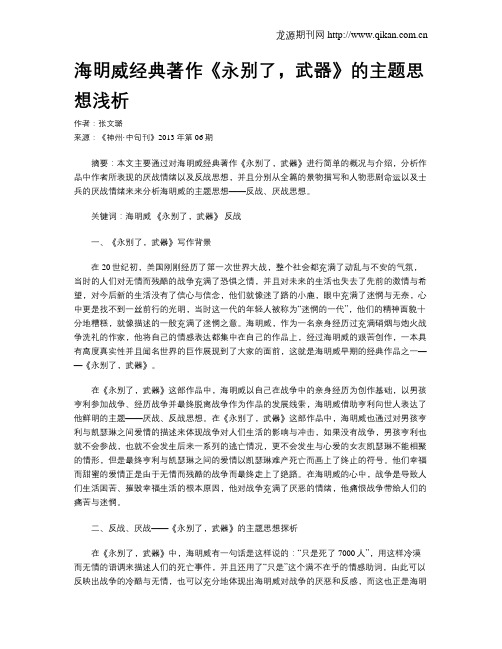
海明威经典著作《永别了,武器》的主题思想浅析作者:张文璐来源:《神州·中旬刊》2013年第06期摘要:本文主要通过对海明威经典著作《永别了,武器》进行简单的概况与介绍,分析作品中作者所表现的厌战情绪以及反战思想,并且分别从全篇的景物描写和人物悲剧命运以及士兵的厌战情绪来来分析海明威的主题思想——反战、厌战思想。
关键词:海明威《永别了,武器》反战一、《永别了,武器》写作背景在20世纪初,美国刚刚经历了第一次世界大战,整个社会都充满了动乱与不安的气氛,当时的人们对无情而残酷的战争充满了恐惧之情,并且对未来的生活也失去了先前的激情与希望,对今后新的生活没有了信心与信念,他们就像迷了路的小鹿,眼中充满了迷惘与无奈,心中更是找不到一丝前行的光明,当时这一代的年轻人被称为“迷惘的一代”,他们的精神面貌十分地糟糕,就像描述的一般充满了迷惘之意。
海明威,作为一名亲身经历过充满硝烟与炮火战争洗礼的作家,他将自己的情感表达都集中在自己的作品上,经过海明威的艰苦创作,一本具有高度真实性并且闻名世界的巨作展现到了大家的面前,这就是海明威早期的经典作品之一——《永别了,武器》。
在《永别了,武器》这部作品中,海明威以自己在战争中的亲身经历为创作基础,以男孩亨利参加战争、经历战争并最终脱离战争作为作品的发展线索,海明威借助亨利向世人表达了他鲜明的主题——厌战、反战思想。
在《永别了,武器》这部作品中,海明威也通过对男孩亨利与凯瑟琳之间爱情的描述来体现战争对人们生活的影响与冲击,如果没有战争,男孩亨利也就不会参战,也就不会发生后来一系列的逃亡情况,更不会发生与心爱的女友凯瑟琳不能相聚的情形,但是最终亨利与凯瑟琳之间的爱情以凯瑟琳难产死亡而画上了终止的符号。
他们幸福而甜蜜的爱情正是由于无情而残酷的战争而最终走上了绝路。
在海明威的心中,战争是导致人们生活困苦、摧毁幸福生活的根本原因,他对战争充满了厌恶的情绪,他痛恨战争带给人们的痛苦与迷惘。
a farewell to arms主要内容
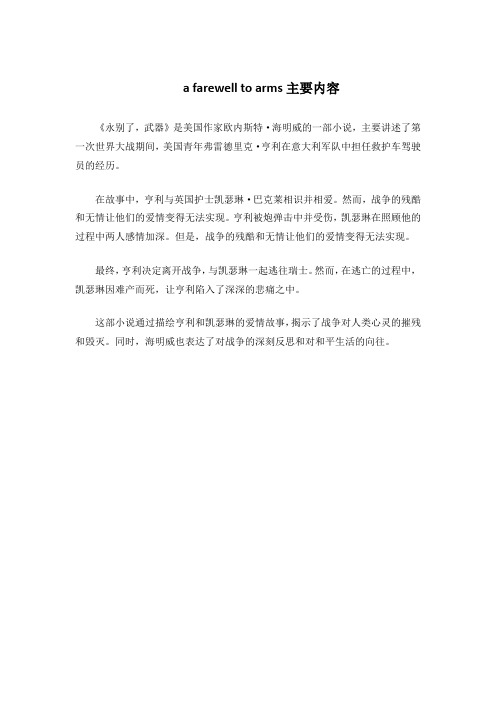
a farewell to arms主要内容
《永别了,武器》是美国作家欧内斯特·海明威的一部小说,主要讲述了第一次世界大战期间,美国青年弗雷德里克·亨利在意大利军队中担任救护车驾驶员的经历。
在故事中,亨利与英国护士凯瑟琳·巴克莱相识并相爱。
然而,战争的残酷和无情让他们的爱情变得无法实现。
亨利被炮弹击中并受伤,凯瑟琳在照顾他的过程中两人感情加深。
但是,战争的残酷和无情让他们的爱情变得无法实现。
最终,亨利决定离开战争,与凯瑟琳一起逃往瑞士。
然而,在逃亡的过程中,凯瑟琳因难产而死,让亨利陷入了深深的悲痛之中。
这部小说通过描绘亨利和凯瑟琳的爱情故事,揭示了战争对人类心灵的摧残和毁灭。
同时,海明威也表达了对战争的深刻反思和对和平生活的向往。
《永别了,武器》演讲

艺术特征
对比:季节和战争;士兵与国王;教士、雷那蒂与凯瑟琳;医 院、旅馆、战场和瑞士小城
战争寓言:燃烧的木柴上逃生的蚂蚁
象征:高山、平原、河流、酒、雪、雨……
潜台词:生命、爱情、家庭;战争、死亡;逃离、洗礼、自欺;放纵、 慰藉;等待、酝酿、暴风雨前夕的安宁;恐惧、命运、虚无……
语言:
冷静、克制的叙事语气与混乱、暴力、血腥的叙述事实之间形成巨 大的张力,能够在宁静中展现生命的尊严和卑微。比如,第九章迫击炮 袭击,第三十章大撤退,第四十一章凯瑟琳之死。
述了非理性的战争如何毁灭人的精神、扼杀人的爱情以及造成人与人之间无 谓地互相残杀的情景,表达了作者明确的反对帝国主义战争的思想认识。但 海明威谴责的不是参加战争的人,也不是制造战争的罪魁祸首,而是战争本 身的种种罪恶和愚蠢。
“迷惘的一代”: 主人公亨利是个消极的和平主义者,他不但从前线逃跑出来,而且也
“哪里还有什么我。我就是你。别 再分出一个独立的我。”“你是我的宗 教,你是我的一切。” “我没有快 乐,已有一个相当长的时期,我认识你 的时候,几乎快发疯了。也许已经发疯 了。但是现在我们快乐幸福,彼此相爱,
你我只要快乐就是了……”
第一部分(1——12):描述了主人公亨利救护队和医院驻地的意大利东北 部的自然景象与军队状况;亨利在医院所在的当地的花园里与凯瑟琳相识 ,产生爱情;亨利在敌人迫击炮袭击时受了重伤,辗转送往米兰美国医院 。
第二部分(13——24):亨利进行了手术,取出腿部的大部分弹片,恢复 得很慢;凯瑟琳被调来成为护士,两人感情迅速升温;凯瑟琳发觉自己怀 孕,表示自己能安排生小孩的事;雨天的交谈;亨利伤好后被迫返回前线 ,两人匆匆告别。
第三阶段: “我每逢听到神圣、广通、牺牲等字眼和徒劳这一说法,总觉得局促不
浅谈《永别了武器》对当代青年的启示意义

《永别了,武器》是美国作家海明威的经典之作,也是一部有关战争的作品。
这部小说以第一次世界大战为背景,揭示了战争的残酷和无意义。
它不仅是艺术的杰作,也给当代青年带来了许多启示意义。
首先,对于当代青年来说,《永别了,武器》向我们传达了反战的思想。
小说中的主人公弗雷德里克·亨利是一名美国志愿军,在战争中经历了许多残酷的现实。
通过亨利的视角,海明威向读者展现了战争带来的破坏和无尽的死亡。
战争让人们失去了家庭、朋友和自由,让人们面临着生死的抉择,造成了巨大的痛苦和不幸。
这使得我们深刻认识到战争的可怕之处,明白了战争对人类社会的毁灭性影响。
对于当代青年而言,作为未来的希望,我们应该反对战争,追求和平与友谊,为世界带来和谐与稳定。
此外,《永别了,武器》还对当代青年的价值观念提供了启示。
小说中的亨利通过战争的经历,对现实世界有了更加清醒的认识。
过去的伪善与虚伪无法承载现实的残酷。
相比之下,小说呈现了一种理性、真实和现实主义的价值观。
亨利将自己的命运交给了命运本身,尽管最后结局不尽人意,但这种勇敢面对现实、顺其自然的态度引发了我们对于幸福与快乐的思考。
我们年轻一代应该摆脱对权力和名利的追求,重新审视自己的价值观,并根据自己的兴趣和热情来追求真正的幸福。
最后,《永别了,武器》还提醒着当代青年关注社会问题。
小说中描绘的战争场景和对人性的思考让我们对社会问题有了更加深刻的认识。
虽然战争属于特殊的历史时期,但是社会问题是普遍存在的。
无论是贫困、不平等还是环境污染,都是我们需要思考和解决的问题。
作为当代年轻一代,我们应该积极参与公益事业,关注社会问题的变化,为社会的发展和进步贡献力量。
永别了·武器
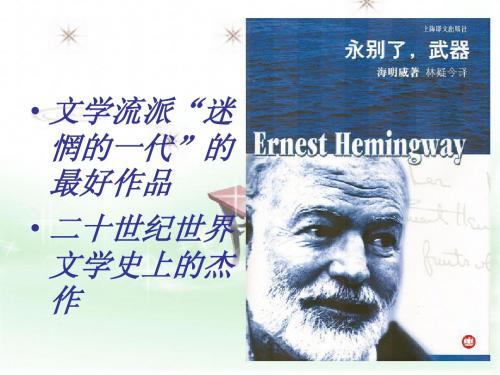
• 描写了一个美国 青年亨利在第一次世界大战中经历的一场关于人生命运 与爱情的悲剧。弗雷德里克· 亨利是一个相貌英俊、身 材高大的美国青年。第一次世界大战爆发时他正巧在意 大利学习建筑,于是主动留下来加入意大利军队,满怀 热情的投入这场“拯救世界民主”的战争。亨利任战地 救护队中尉,开救护车。在前线,在真实的鲜血和生命 面前他感受到了战争的残酷和无意义。他开始意识到战 争中血腥的厮杀不仅同正义、公理风马牛不相及,而且 同他本人“根本就没有什么关系”,他自以为在战争中 能实现的理想和追求现在看来都是虚惘的。于是他从一 个热血青年、“拼命工作”、“老是请求上第一线”开 始变得心灰意懒,玩世不恭。为了填补理想幻灭带来的 精神上的空虚,逃避他无法更改的噩梦般的现实,亨利 热衷于用酒精麻痹自己。在这种精神状态下他认识了美 丽的英国护士凯瑟琳。一开始他并没有认真,他经常去 看凯瑟琳不过是为了消解精神的寂寞和空虚。
• 文学流派“迷
惘的一代”的 最好作品 • 二十世纪世界 文学史上的杰 作
《永别了,武器》
• • • • 作 者:[美] 海明威 类 别:小说 成书时间:1929年 作者简介:海明威是蜚声世界文坛的美国 现代著名小说家,也是最受中国读者喜爱 的美国作家。代表作有《太阳照样升起》、 《永别了,武器》、《老人与海》等。 1954年因中篇小说《老人与海》获诺贝尔 文学奖。1961年7月2日的早晨,海明威在 家中用猎枪结束了自己长期被病痛折磨的 生命
小说名段
一个告别了武器的人,不是敌人的俘虏,就是 爱的俘虏.我不是不善于自我保护,实在是一个放弃 自我保护的人.就如同生命的数据库,已经不需要进 入的密码,随时都可以打开全部程序,可以读出全部 的文件.我说的俘虏,就是这个意义上的俘虏.当我 把自我放到阳光下的时候,我明白从此不能有所伪 装,隐蔽的日子一想起就令人不安.当我意识到抗拒 的无奈,有多少时间无可挽回,有多少记忆渐渐从内 心淡出.说到底,俘虏就是一个不能抵挡伤害的人, 就是要有足够的勇气放弃希望,必须承受生存的全 部压力.本来,在属于个人的空间,可以沉浸于独自 的幻想,可以从尘埃里开出虚拟的花朵.而一个放弃 自我保护的人是连欺骗自己都不能,只有不断地净 化内心世界. 才能完善自己.
《永别了,武器》观后感
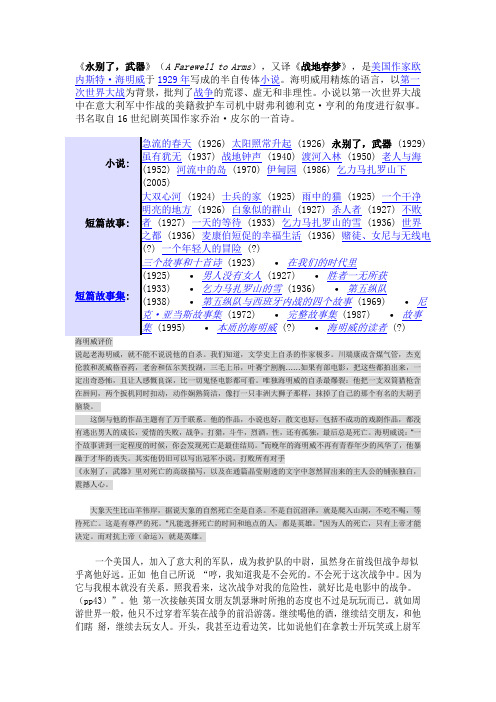
《永别了,武器》(A Farewell to Arms),又译《战地春梦》,是美国作家欧内斯特·海明威于1929年写成的半自传体小说。
海明威用精炼的语言,以第一次世界大战为背景,批判了战争的荒谬、虚无和非理性。
小说以第一次世界大战中在意大利军中作战的美籍救护车司机中尉弗利德利克·亨利的角度进行叙事。
书名取自16世纪剧英国作家乔治·皮尔的一首诗。
说起老海明威,就不能不说说他的自杀。
我们知道,文学史上自杀的作家极多。
川端康成含煤气管,杰克伦敦和茨威格吞药,老舍和伍尔芙投湖,三毛上吊,叶赛宁割腕……如果有部电影,把这些都拍出来,一定出奇恐怖,且让人感慨良深,比一切鬼怪电影都可看。
唯独海明威的自杀最爆裂:他把一支双筒猎枪含在唇间,两个扳机同时扣动,动作娴熟简洁,像打一只非洲大狮子那样,抹掉了自己的那个有名的大胡子脑袋。
这倒与他的作品主题有了万千联系。
他的作品,小说也好,散文也好,包括不成功的戏剧作品,都没有逃出男人的成长,爱情的失败,战争,打猎,斗牛,烈酒,性,还有孤独,最后总是死亡。
海明威说:“一个故事讲到一定程度的时候,你会发现死亡是最佳结局。
”而晚年的海明威不再有青春年少的风华了,他暴躁于才华的丧失。
其实他仍旧可以写出冠军小说,打败所有对手《永别了,武器》里对死亡的高级描写,以及在通篇晶莹剔透的文字中忽然冒出来的主人公的铺张独白,震撼人心。
大象天生比山羊伟岸,据说大象的自然死亡全是自杀。
不是自沉沼泽,就是爬入山洞,不吃不喝,等待死亡。
这是有尊严的死。
“凡能选择死亡的时间和地点的人,都是英雄。
”因为人的死亡,只有上帝才能决定。
而对抗上帝(命运),就是英雄。
一个美国人,加入了意大利的军队,成为救护队的中尉,虽然身在前线但战争却似乎离他好远。
正如他自己所说“哼,我知道我是不会死的。
不会死于这次战争中。
因为它与我根本就没有关系。
照我看来,这次战争对我的危险性,就好比是电影中的战争。
- 1、下载文档前请自行甄别文档内容的完整性,平台不提供额外的编辑、内容补充、找答案等附加服务。
- 2、"仅部分预览"的文档,不可在线预览部分如存在完整性等问题,可反馈申请退款(可完整预览的文档不适用该条件!)。
- 3、如文档侵犯您的权益,请联系客服反馈,我们会尽快为您处理(人工客服工作时间:9:00-18:30)。
Brief introduction about Hemingway
Especially for his typical
beard…
When we think of Hemingway,we may have this kind of image in our mind…
What do you know about Hemingway?
His typical beard
His famous works,
such as The Old Man and the Sea(老人与海) For Whom the Bell Tolls(丧钟为谁而鸣) The Sun Also Rises(太阳照常升起)
a productive writer
Brief introduction about Hemingway
However, when he was young, WHAT A HANDSOME MAN!!!
Brief introduction about Hemingway(海明威)
He was called “The Lost Generation ”,which refers to the group of American writers who came of age during World War I and whose values could not operate in the postwar world. (迷惘的一代代表 作家) During World War I he served as an ambulance driver in France and in the Italian infantry(步兵团) and was wounded just before his 19th birthday. (一战的从军经历) In 1954, Hemingway was awarded the Nobel Prize for Literature. (1954,因《老人与海》而获诺贝尔文学奖) In July, 1961, he committed suicide by shooting himself. (1961, 开枪自杀)
A Farewell to Arms
《永别了,武器》 Hemingway
——Made by
Contents
Brief introduction about Hemingway(海明威)
Something about the book
Famous sentences and paragraphs
Something about the book
The novel is a semi-autobiographical novel of Hemingway who had World War I experiences.(《永别了,武器》是海明威半自传体式的小说) A Farewell to Arms is about the tragic romance between an American soldier Frederic Henry, and Catherine Barkley, a British nurse.(小说讲述了男主角 亨利和女主角凯瑟琳之间的爱情悲剧) The novel is about the individual tragedy in World War Ⅰ within the larger picture of greater tragedy.(战争中的个人悲剧与整个人类的悲剧) The book is also an anti-war novel, as the vivid descriptions of its brutality and cruelty.(反战题材小说,反映了战争的残酷与血腥)
That’s all!
Thank you!
——Made by
Famous sentences and paragraphs
Anti-war ideas
“I threw away the goddam truss so it would get bad line again.”
——from an injured soldier
“我故意丢掉了那条该死的疝带,希望病状恶化就不必上前线 了。”
Famous sentences and paragraphs
The use of objective correlatives(客观事物) and vivid details
“After dinner we walked through the galleria,past the other restaurauts and the shops with their steel shutters down,and stopped at the little place where they sold sandwiches; ham and lettuce sandwiches and anchovy sandwiches made of very tiny brown glazed rolls and only about as long as your fingers. ”
“吃完饭,我们在拱廊里散步,经过别的酒家饭店和那些已经上了钢窗板的店铺在一个 卖三明治的小摊前停下来,买了火腿生菜三明治,鳀鱼三明治,后者是用很细的涂过糖 的褐色的面包卷做成,只有手指那么长。”
These things often serve no purpose other than to paint a mood for the reader.
